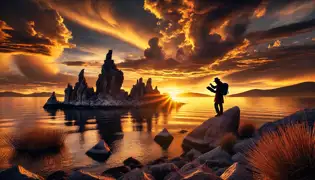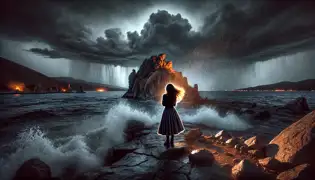The Singing Rocks of Lake Titicaca
Reading Time: 8 min

About Story: The Singing Rocks of Lake Titicaca is a Legend from bolivia set in the Contemporary. This Dramatic tale explores themes of Wisdom and is suitable for Adults. It offers Cultural insights. A journey into the mystical heart of Lake Titicaca, where legend and reality converge.
The Andean sky stretched in an endless expanse of deep blue above Lake Titicaca, the air so crisp it felt like a knife cutting through Elena Cruz’s lungs. Growing up in La Paz, Elena had always heard the legends of the lake—a sacred place for the Aymara and Inca peoples, brimming with stories of gods, spirits, and treasures lost to time. But one legend haunted her dreams more than any other: the Singing Rocks. It was said that, at sunset, stones near Isla del Sol would come alive with an unearthly melody, their song carrying the weight of secrets older than the lake itself.
She first heard the tale as a child, nestled at her grandmother’s feet by a crackling fire. “The rocks are alive, niña,” her grandmother whispered, her weathered hands weaving a tale. “They sing to those with pure hearts. But beware—if you approach them with greed, they’ll curse you, dragging you into the lake’s depths.”
Now, as an anthropologist with a passion for Andean mythology, Elena had the opportunity to chase the story that had captivated her imagination since childhood. Funded by a university research grant, she had set out for Lake Titicaca with a team, determined to uncover the truth about the Singing Rocks. Copacabana greeted Elena with a mixture of serenity and subtle unease. The town perched on the lake’s edge was a postcard of cobblestone streets, whitewashed buildings, and colorful markets alive with the scents of grilled trout and coca tea. Yet, as she asked locals about the Singing Rocks, their responses were cryptic. Many crossed themselves and muttered prayers under their breath, avoiding her gaze. “The rocks are not for outsiders,” one vendor warned, handing her a bag of fresh mangos. “They sing for the spirits, not for curious ears.” Elena’s guide, an elderly Aymara man named Don Teodoro, seemed less dismissive but no less cautious. He agreed to take her to Isla del Sol, but only after performing a small ritual on the lakeshore. He sprinkled coca leaves and llama fat onto a makeshift altar of stones and murmured a prayer in Aymara. When Elena asked him about the ritual, he gave her a knowing smile. “The lake is alive, Doctora Cruz. It sees you. If you’re not welcome, it will make itself known.” The reed boat was nothing like the modern motorboats bobbing nearby. It swayed with the gentle rhythm of the lake as Don Teodoro paddled steadily, his lined face impassive. Elena sat at the bow, her notebook open but untouched, distracted by the lake’s overwhelming presence. The water shimmered under the midday sun, its surface a mirror reflecting snow-capped peaks in the distance. “El lago Titicaca is sacred,” Don Teodoro said after a long silence. “To us, it is not just water. It is the womb of creation. The Singing Rocks… they are part of that creation.” “Do you believe the rocks actually sing?” Elena asked, breaking the spell of the lake’s quiet. He didn’t answer right away. Instead, he stared at the horizon, his eyes squinting against the sunlight. Finally, he said, “They sing, yes. But whether you will hear them depends on your heart.” They reached Isla del Sol as the sun hung low, casting golden light across the terraced hills. The island was quiet, save for the occasional bleat of a goat or the distant laughter of children. Don Teodoro led her to a small village where they would spend the night. “Tomorrow, we will go to the rocks,” he said. “For now, rest. You’ll need it.” Elena woke early, eager to explore the island. She spent the morning documenting the Incan ruins scattered across the hills: the labyrinth-like Chinkana and the ceremonial table at the island’s highest point. But as the day wore on, her thoughts kept returning to the Singing Rocks. Don Teodoro guided her to a secluded cove in the late afternoon. The path wound through dense vegetation before opening onto a rocky shoreline. There, jutting from the water, were the Singing Rocks—blackened and jagged, their surfaces glinting like obsidian in the fading light. They looked ancient, almost alive. “Stay still,” Don Teodoro said as the sun dipped lower. “Listen.” At first, there was only the sound of the lake’s gentle waves lapping against the stones. Then, as the sun kissed the horizon, a faint hum emerged. It wasn’t a single note but a harmony of tones, deep and resonant, like a chorus echoing through the water and air. The sound grew louder, filling the cove with an otherworldly melody. Elena’s breath caught. It wasn’t just sound—it was something deeper, something that seemed to vibrate in her chest and bones. She scribbled furiously in her notebook, trying to capture the moment, but words felt inadequate. “What… what is it?” she whispered. Don Teodoro didn’t answer. He simply knelt by the water’s edge, his head bowed as if in prayer. The song stayed with Elena long after the sun had set, haunting her dreams that night. She couldn’t shake the feeling that the rocks were more than a geological curiosity. The next morning, as she shared her observations with the villagers, a woman named Yara approached her, clutching a weathered piece of parchment. “This belonged to my grandfather,” Yara said, her voice trembling. “He believed the Singing Rocks guarded a great treasure—a temple beneath the lake.” The map was crude but unmistakable, marking a path from the cove to a point deep underwater. Elena’s pulse quickened. If the map was real, it could lead to one of the greatest discoveries in Andean history. But Don Teodoro’s face darkened as he studied the parchment. “This is not treasure for humans,” he warned. “The rocks protect what lies beneath. To disturb it is to invite the lake’s wrath.” But Elena couldn’t let it go. The scientist in her burned with curiosity. That evening, she convinced Don Teodoro to take her diving, promising they would disturb nothing. The water was icy, even through Elena’s wetsuit, as they descended into the depths. Guided by the map and the faint vibrations of the rocks’ song, they swam toward a submerged cavern. The entrance was marked by two massive stone pillars, their surfaces carved with intricate patterns that glowed faintly in the dim light. Inside, the cavern opened into a vast chamber filled with bioluminescent algae, casting an eerie green glow. At its center stood an enormous stone altar, its surface etched with constellations and strange symbols. Surrounding it were statues of figures with elongated limbs and serene expressions, their hands raised as if in worship. Elena’s heart pounded. This wasn’t just a temple—it was something older, something otherworldly. She reached out to touch one of the carvings, but a sudden vibration stopped her. The song grew louder, almost deafening, and the water seemed to pulse with energy. Don Teodoro grabbed her arm, his eyes wide with fear. They surfaced moments later, gasping for air. “We were not meant to see that,” he said, his voice shaking. Word of Elena’s discovery spread quickly through the village, and reactions were mixed. Some praised her bravery, while others whispered of curses. That night, as a storm raged over the lake, Elena lay awake, her mind racing. Thunder rolled like the voice of an angry god, and the wind howled through the village. Suddenly, the Singing Rocks’ melody rose above the storm, piercing and frantic. Elena ran to the cove, where she found the rocks glowing faintly. The melody seemed to plead, warning her to leave. The storm grew fiercer, and a massive wave crashed over the rocks, nearly sweeping her off her feet. She fell to her knees, trembling. “I’m sorry,” she whispered. “I didn’t mean to disturb you.” As if in response, the song softened, and the storm began to subside. Elena stumbled back to the village, shaken but alive. Elena knew she couldn’t stay. The lake had made itself clear. Before leaving, she presented her findings to the villagers, urging them to protect the site. “This is not just history—it’s a sacred legacy,” she said. Don Teodoro walked her to the boat the next morning. “You are lucky,” he told her. “The lake spared you because your heart was true. But remember—this is not your story to tell.” Elena nodded, the weight of his words sinking in. As the boat carried her away, she looked back at the island, its cliffs glowing in the morning light. The Singing Rocks were silent, but she could still feel their song in her heart. Back in La Paz, Elena published her research but left out key details, ensuring the rocks’ location remained a mystery. She continued to study Andean mythology, her respect for the lake and its guardians deepened. Though she never returned to Lake Titicaca, its melodies haunted her dreams, a reminder that some mysteries are meant to remain unsolved. To this day, visitors to Isla del Sol claim to hear strange songs at sunset, carried on the wind like whispers from another world. Perhaps the Singing Rocks still watch over the lake, waiting for those who dare to listen.A Warning in the Wind

The Journey to Isla del Sol
The First Song

The Map
Beneath the Surface

The Curse
The Keeper’s Legacy
Epilogue: The Eternal Song


















